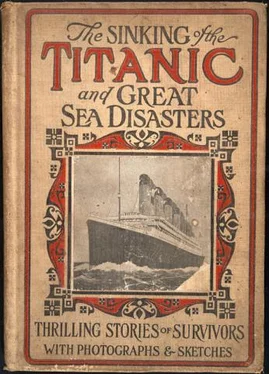Logan Marshall - Sinking of the Titanic and Great Sea Disasters
Здесь есть возможность читать онлайн «Logan Marshall - Sinking of the Titanic and Great Sea Disasters» весь текст электронной книги совершенно бесплатно (целиком полную версию без сокращений). В некоторых случаях можно слушать аудио, скачать через торрент в формате fb2 и присутствует краткое содержание. Год выпуска: 1912, Жанр: Прочая документальная литература, на английском языке. Описание произведения, (предисловие) а так же отзывы посетителей доступны на портале библиотеки ЛибКат.
- Название:Sinking of the Titanic and Great Sea Disasters
- Автор:
- Жанр:
- Год:1912
- ISBN:нет данных
- Рейтинг книги:4.5 / 5. Голосов: 2
-
Избранное:Добавить в избранное
- Отзывы:
-
Ваша оценка:
- 100
- 1
- 2
- 3
- 4
- 5
Sinking of the Titanic and Great Sea Disasters: краткое содержание, описание и аннотация
Предлагаем к чтению аннотацию, описание, краткое содержание или предисловие (зависит от того, что написал сам автор книги «Sinking of the Titanic and Great Sea Disasters»). Если вы не нашли необходимую информацию о книге — напишите в комментариях, мы постараемся отыскать её.
’s demise!
Sinking of the Titanic and Great Sea Disasters — читать онлайн бесплатно полную книгу (весь текст) целиком
Ниже представлен текст книги, разбитый по страницам. Система сохранения места последней прочитанной страницы, позволяет с удобством читать онлайн бесплатно книгу «Sinking of the Titanic and Great Sea Disasters», без необходимости каждый раз заново искать на чём Вы остановились. Поставьте закладку, и сможете в любой момент перейти на страницу, на которой закончили чтение.
Интервал:
Закладка:
Strange to say, there was room in this boat for ten other people. Ten brave men would have received the warmest welcome of their lives if they had been there. The coward, being a quartermaster and the assigned head of the boat, sat in the stern and steered. He was terrified, and the women had to fight against his pessimism while they tugged at the oars.
The women sat two at each oar. One held the oar in place, the other did the pulling. Mrs. Brown coached them and cheered them on. She told them that the exercise would keep the chill out of their veins, and she spoke hopefully of the likelihood that some vessel would answer the wireless calls. Over the frightful danger of the situation the spirit of this woman soared.
And the coward sat in his stern seat, terrified, his tongue loosened with fright. He assured them there was no chance in the world. He had had fourteen years’ experience, and he knew. First, they would have to row one and a half miles at least to get out of the sphere of the suction, if they did not want to go down. They would be lost, and nobody would ever find them.
“Oh, we shall be picked up sooner or later,” said some of the braver ones. No, said the man, there was no bread in the boat, no water; they would starve—all that big boatload wandering the high seas with nothing to eat, perhaps for days.
“Don’t,” cried Mrs. Brown. “Keep that to yourself, if you feel that way. For the sake of these women and children, be a man. We have a smooth sea and a fighting chance. Be a man.”
But the coward only knew that there was no compass and no chart aboard. They sighted what they thought was a fishing smack on the horizon, showing dimly in the early dawn. The man at the rudder steered toward it, and the women bent to their oars again. They covered several miles in this way—but the smack faded into the distance. They could not see it any longer. And the coward said that everything was over.
They rowed back nine weary miles. Then the coward thought they must stop rowing, and lie in the trough of the waves until the Carpathia should appear. The women tried it for a few moments, and felt the cold creeping into their bodies. Though exhausted from the hard physical labor they thought work was better than freezing.
“Row again!” commanded Mrs. Brown.
“No, no, don’t,” said the coward.
“We shall freeze,” cried several of the women together. “We must row. We have rowed all this time. We must keep on or freeze.”
When the coward still demurred, they told him plainly and once for all that if he persisted in wanting them to stop rowing, they were going to throw him overboard and be done with him for good. Something about the look in the eye of that Mississippi-bred oarswoman, who seemed such a force among her fellows, told him that he had better capitulate. And he did.
Miss Alice Farnam Leader, a New York physician, escaped from the Titanic on the same boat which carried the Countess Rothes. “The countess is an expert oarswoman,” said Doctor Leader, “and thoroughly at home on the water. She practically took command of our boat when it was found that the seaman who had been placed at the oars could not row skilfully. Several of the women took their place with the countess at the oars and rowed in turns, while the weak and unskilled stewards sat quietly in one end of the boat.”
“With nothing on but a nightgown I helped row one of the boats for three hours,” said Mrs. Florence Ware, of Bristol, England.
“In our boat there were a lot of women, a steward and a fireman. None of the men knew anything about managing a small boat, so some of the women who were used to boats took charge.
“It was cold and I worked as hard as I could at an oar until we were picked up. There was nothing to eat or drink on our boat.”
“The temperature must have been below freezing,” testified another survivor, “and neither men nor women in my boat were warmly clothed. Several of them died. The officer in charge of the life-boat decided it was better to bury the bodies. Soon they were weighted so they would sink and were put overboard. We could also see similar burials taking place from other life-boats that were all around us.”
{illust. caption = SURVIVORS OF THE GREAT MARINE DISASTER
The first authentic photograph,…}
{illust. caption = Copyright by Campbell Studio. N. Y.
COLONEL AND MRS. JOHN JACOB ASTOR
Mrs. Astor, nee Miss Madeline Force, was rescued. Colonel Astor who bravely refused to take a place in the life-boats, went down with the Titanic.}
In one boat were two card sharps. With the same cleverness that enabled them to win money on board they obtained places in the boats with the women.
In the boat with the gamblers were women in their night-gowns and women in evening dress. None of the boats were properly equipped with food, but all had enough bread and water to keep the rescued from starving until the expected arrival of help.
To the credit of the gamblers who managed to escape, it should be said that they were polite and showed the women every courtesy. All they wanted was to be sure of getting in a boat. That once accomplished, they reverted to their habitual practice of politeness and suavity. They were even willing; to do a little manual labor, refusing to let women do any rowing.
The people on that particular boat were a sad group. Fathers had kissed their daughters good-bye and husbands had parted from their wives. The card sharps, however philosophized wonderfully about the will of the Almighty and how strange His ways. They said that one must be prepared for anything; that good always came from evil, and that every cloud had a silvery lining{.}
“Who knows?” said one. “It may be that everybody on board will be saved.” Another added: “Our duty is to the living. You women owe it to your relatives and friends not to allow this thing to wreck your reason or undermine your health.” And they took pains to see that all the women who were on the life-boat had plenty of covering to keep them from the icy blasts of the night.
The survivors were in the life-boats until about 5.30 A. M. About 3 A. M. faint lights appeared in the sky and all rejoiced to see what was supposed to be the coming dawn, but after watching for half an hour and seeing no change in the intensity of the light, the disappointed sufferers realized it was the Northern Lights. Presently low down on the horizon they saw a light which slowly resolved itself into a double light, and they watched eagerly to see if the two lights would separate and so prove to be only two of the boats, or whether these lights would remain together, in which case they should expect them to be the lights of a rescuing steamer.
To the inexpressible joy of all, they moved as one! Immediately the boats were swung around and headed for the lights. Someone shouted: “Now, boys, sing!” and everyone not too weak broke into song with “Row for the shore, boys.” Tears came to the eyes of all as they realized that safety was at hand. The song was sung, but it was a very poor imitation of the real thing, for quavering voices make poor songs. A cheer was given next, and that was better—you can keep in tune for a cheer.
“Our rescuer showed up rapidly, and as she swung round we saw her cabins all alight, and knew she must be a large steamer. She was now motionless and we had to row to her. Just then day broke, a beautiful quiet dawn with faint pink clouds just above the horizon, and a new moon whose crescent just touched the horizon. ‘Turn your money over, boys,’ said our cheery steersman, ‘that is, if you have any with you,’ he added.
Читать дальшеИнтервал:
Закладка:
Похожие книги на «Sinking of the Titanic and Great Sea Disasters»
Представляем Вашему вниманию похожие книги на «Sinking of the Titanic and Great Sea Disasters» списком для выбора. Мы отобрали схожую по названию и смыслу литературу в надежде предоставить читателям больше вариантов отыскать новые, интересные, ещё непрочитанные произведения.
Обсуждение, отзывы о книге «Sinking of the Titanic and Great Sea Disasters» и просто собственные мнения читателей. Оставьте ваши комментарии, напишите, что Вы думаете о произведении, его смысле или главных героях. Укажите что конкретно понравилось, а что нет, и почему Вы так считаете.












